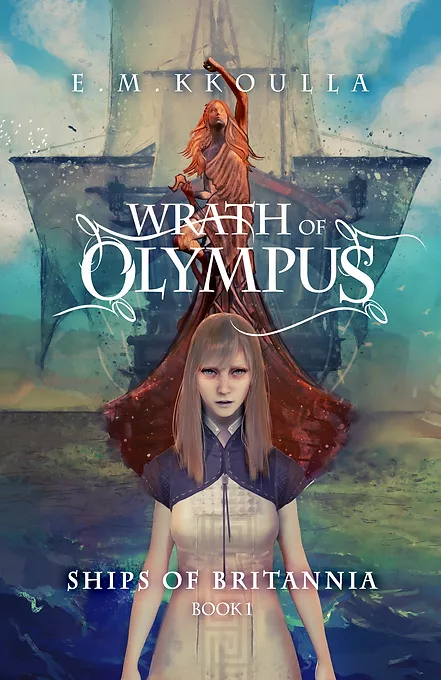Wrath of Olympus (Ships of Britannia #1), by E. M. Kkoulla
29 Aug 2022The Book

Synopsis:
The Roman Empire never fell. The Gods are real. Ships are alive.
In the Province of Britannia, ruled by descendants of King Arthur and on the brink of an industrial revolution, young Maia Abella is on the run.
Something unseen has murdered her cruel mistress and she’s being blamed. The streets and factories of Portus are no place for a friendless girl, trapped in events beyond her control.
The city authorities and the Royal Navy are both desperate to find her – one investigating a killer, the other to recruit her, while the deadly legacy of a tragic past stalks her every step.
Aided by Raven, an ancient, blind Mage with a terrible secret and Milo, Crown Agent and spy, Maia must discover and overcome the fatal consequences of her birth.
Meanwhile, the Gods are making their moves. And not all of them are friendly.
My Review
Wrath of Olympus is the first novel in the Ships of Britannia trilogy, by the English author E. M. Kkoulla. It makes a really interesting mix between Roman mythology, steampunk, and fantasy, and that I enjoyed so much.
We are going to follow the story of Maia Abella, an orphan that was abandoned at a Foundling Home, and who is doing her last two years and a half as a servant, in order to be free for choosing her own destiny, being often mistreated by her mistress, until an unknown force killed her. This is how we are introduced to the world of Ships of Britannia.
And let’s stop a bit to talk about the world of Ships of Britannia because it’s one of the best worldbuilding tasks I’ve had the pleasure to see. It’s not a secret that I love to learn about history, and it is said that «the devil is in the details». There’s a big job of investigation behind this book, as it is reflected in the Roman religion details, their pantheon; on how the society works (taking it to the 2044 setting). The fantasy details are really well introduced, such as the living Ships concepts, how this Britain expanded into North America and has different commercial routes with the East, Gods acting in the mortals’ life… and despite all the information that is needed to be introduced in this book, there aren’t big info dumping paragraphs, as the author makes the best use of the good old «show, don’t tell», avoiding slogging the pace of the novel.
After this incident with her mistress, Maia is recruited into the Navy, to get trained and become a living Ship. Despite she thinks she lacks Potentia, the quality that makes girls into living Ship, a really important task for the Navy, thanks to her eidetic memory and her effort, she passes the formation at earth phase and gets enrolled into the Blossom. Meanwhile, Gods are moving, and we are going to see the consequence of their acts.
The story’s pace is really well structured, as we can clearly see where the different acts start and finish. Also, it takes a different twist from classical structures, because the narrative knot is solved before than expected, which let the author more time to expand the journey of Maia and to give more details about the world. Characters are lovable, easy to connect with, well defined. Maia has the main spotlight, but at some point, we can see it being changed to show things that are covered to Maia, but without giving full explanations until the main character gets to them.
In summary, Wrath of Olympus is a great book for fantasy lovers who have a passion for history, especially for the Roman period, but who can also be drawn by the steampunk vibes. I found it really enjoyable, a great novel. We will return to this series with Prey of the Huntress, the second book on Ships of Britannia.
The Author/s

E. M. Kkoulla
E. M. Kkoulla lives with her husband and two feline overlords in the Calder Valley, West Yorkshire. After many years of teaching very small children, she decided to finally put her degree in Classical Studies, along with decades of re-enacting 16th and 17th-century life, to constructive use. Her hobbies include singing in various choirs, walking in the hills, and watching anything with gods, superheroes, and monsters trashing the landscape.
